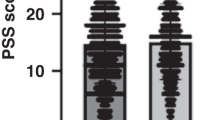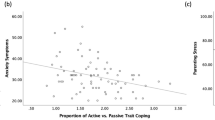Abstract
Objectives
Greater weight gain in infancy is a risk factor for childhood obesity. The present study examined the interaction between infant temperament and parent use of food to soothe infant distress (FTS) as predictors of weight gain across the first 2 years of life.
Subjects/Methods
A total of 160 mother–infant dyads were recruited into a longitudinal study. Infant temperament was assessed by parents through a questionnaire (surgency, negativity) and by observer ratings (surgency, irritability) during a laboratory visit when infants were 6 months old. Parents also completed a 3-day infant cry diary when their children were 6 months of age to assess when they used food in response to infant cry/fuss bouts. Infant weight/length was measured in the lab at 6 and 18 months. Multiple regressions were run to test the moderating effect of FTS on weight gain.
Results
Significant interactions were revealed for both measures of surgency and parent FTS in predicting weight gain. Surgent infants whose parents had a greater tendency to use FTS had greater weight-for-length gain in 1 year than if their parents tended to use less FTS. The interaction between observer ratings of irritability and parent FTS was also significant but in an unexpected direction.
Conclusions
The findings point to the role of temperament, specifically surgency, in weight gain during infancy, but only if their parents used FTS. Surgency may have evoked this feeding practice that increased their health risk.
This is a preview of subscription content, access via your institution
Access options
Subscribe to this journal
Receive 12 print issues and online access
$259.00 per year
only $21.58 per issue
Buy this article
- Purchase on Springer Link
- Instant access to full article PDF
Prices may be subject to local taxes which are calculated during checkout


Similar content being viewed by others
References
Rothbart M, Bates J. Temperament. In: Damon W, Lerner R, Eisenberg N, editors. Handbook of child psychology, Sixth edition: Social, emotional, and personality development. 3. New York: Wiley; 2006. p. 99-166.
Blissett J, Farrow C. Predictors of maternal control of feeding at 1 and 2 years of age. Int J Obes (Lond). 2007;31:1520–6.
McMeekin S, Jansen E, Mallan K, Nicholson J, Magarey A. Associations between infant temperament and early feeding practices. A cross-sectional study of Australian mother-infant dyads from the NOURISH randomised controlled trial. Appetite. 2013;60:239–45.
Wasser H, et al. Infants perceived as “fussy” are more likely to receive complementary foods before 4 months. Pediatrics. 2011;127:229–37.
Doub AE, Moding KJ, Stifter CA. Infant and maternal predictors of early life feeding decisions. The timing of solid food introduction. Appetite. 2015;92:261–8.
Carey W. Temperament and increased weight gain in infants. J Dev Behav Pediatr. 1985;6:128–31.
Hittner JB, Johnson C, Tripicchio G, Faith MS. Infant emotional distress, maternal restriction at a home meal, and child BMI gain through age 6 years in the Colorado Adoption Project. Eat Behav. 2016;21:135–41.
Niegel S, Ystrom E, Vollrath ME. Is difficult temperament related to overweight and rapid early weight gain in infants? A prospective cohort study. J Dev Behav Pediatr. 2007;28:462–6.
Agras WS, Hammer LD, McNicholas F, Kraemer HC. Risk factors for childhood overweight: a prospective study from birth to 9.5 years. J Pediatr. 2004;145:20–5.
Slining M, Adair L, Goldman B, Borja J, Bentley M. Infant temperament contributes to early infant growth: a prospective cohort of African American infants. Int J Behav Nutr Phys Act. 2009;6:51.
Wells J, et al. Investigation of the relationship between infant temperament and later body composition. Int J Obes. 1997;21:400–6.
Darlington A-S, Wright CM. The influence of temperament on weight gain in early infancy. J Dev Behav Pediatr. 2006;27:329–35.
Burton P, et al. Association between infant correlates of impulsivity--surgency (extraversion)--and early infant growth. Appetite. 2011;57:504–9.
Seifer R, Sameroff A, Dickstein S, Schiller M, Hayden L. Your own children are special: clues to the sources of reporting bias in temperament assessments. Infant Behav Dev. 2004;27:323–41.
Wardle J, Sanderson S, Gutherie C, Rapoport L, Plomin R. Parental feeding style and the inter-generational transmission of obesity risk. Obes Res. 2002;10:453–62.
Vollrath M, Tonstad S, Rothbart M, Hampson S. Infant temperament is associated with potentially obesogenic diet at 18 months. Int J Pediatr Obes. 2011;6:e408–14.
Baughcum A, et al. Maternal feeding practices and beliefs and their relationships to overweight in early childhood. J Dev Behav Pediatr. 2001;22:391–408.
Stifter C, Anzman - Frasca S, Birch L, Voegtline K. Parent use of food to soothe infant/toddler distress and child weight status: an exploratory study. Appetite. 2011;57:693–9.
Evans A, et al. Parental feeding practices and concerns related to child underweight, picky eating, and using food to calm differ according to ethnicity/race, acculturation and income. Matern Child Health. 2011;15:899–909.
Musher-Eizenman D, Holub S. Comprehensive Feeding Practices Questionnaire: validation of a new measure of parental feeding practices. J Pediatr Psychol. 2007;32:960–972.
Stifter CA, Moding KJ. Understanding and measuring parent use of food to soothe infant and toddler distress: a longitudinal study from 6 to 18 months of age. Appetite. 2015;95:188–96.
Braden A, et al. Associations between child emotional eating and general parenting style, feeding practices and parent psychopathology. Appetite. 2014;80:35–40.
Sleddens E, et al. Food parenting practices and child dietary behavior. Prospective relations and the moderating role of general parenting. Appetite. 2014;79:42–50.
Rodenburg G, Kremers S, Oenema A, van de Mheen D. Associations of parental feeding styles with child snacking behavior and weight in the context of general parenting. Public Health Nutr. 2013;17:960–9.
Blisset J, Haycraft E, Farrow C. Inducing preschool children’s emotional eating: relations with parental feeding practices. Am J Clin Nutr. 2010;92:359–65.
Carnell S, Wardle J. Associations between multiple measures of parental feeding and children’s adiposity in United Kingdom preschoolers. Obesity. 2007;15:137–44.
Monteiro PO, Victora CG. Rapid growth in infancy and childhood and obesity in later life--a systematic review. Obes Rev. 2005;6:143–54.
Stifter C, Spinrad T. The effect of excessive crying on the development of emotion regulation. Infancy. 2002;3:133–52.
Barr RG, Kramer MS, Boisjoly C, McVey-White L, Pless IB. Parental diary of infant cry and fuss behaviour. Arch Dis Child. 1988;63:380–7.
Gartstein M, Rothbart M. Studying infant temperament via the Revised Infant Behavior Questionnaire. Infant Behav Dev. 2003;26:64–86.
Stifter C, Willoughby M, Towe-Goodman N. Agree or agree to disagree? Assessing the convergence between parents and observers on infant temperament. Infant Child Dev. 2008;17:407–26.
Grummer-Strawn LM, Reinold C, Krebs NF, Centers for Disease Control and Prevention (CDC). Use of World Health Organization and CDC growth charts for children aged 0-59 months in the United States. MMWR Recomm Rep. 2010;59:1–15.
Baird J, et al. Being big or growing fast: systematic review of size and growth in infancy and later obesity. Br Med J. 2005;331:929–31.
Stettler N, Kumanyika S, Katz S, Zemel B, Stallings V. Rapid weight gain during infancy and obesity in young adulthood in a cohort of African Americans. Am J Clin Nutr. 2003;77:1374–8.
Dennison B, Edmunds L, Stratton H, Pruzek R. Rapid infant weight gain predicts childhood overweight. Obesity. 2006;14:491–9.
Blass E. Milk-induced hypoalgesia in human newborns. Pediatrics. 1997;99:825–9.
Moding K., Stifter C. Does temperament underlie infant novel food responses?: Continuity of approach-withdrawal from 6 to 18 months. Child Dev. 2017 in press.
Leung CY, et al. Surgency and negative affectivity, but not effortful control, are uniquely associated with obesogenic eating behaviors among low-income preschoolers. Appetite. 2014;78:139–46.
Leung CY, et al. Low-income pre-schoolers with higher temperamental surgency enjoy and respond more to food, mediating the path to higher body mass index. Pediatr Obes. 2016;11:181–6.
Carver C, Harmon-Jones E. Anger is an approach-related affect: evidence and implications. Psychol Bull. 2009;135:183–204.
Davis C, et al. From motivation to behaviour: a model of reward sensitivity, overeating, and food preferences in the risk profile for obesity. Appetite. 2007;48:12–9.
Verbeken S, Braet C, Lammertyn J, Goossens L, Moens E. How is reward sensitivity related to bodyweight in children? Appetite. 2012;58:478–3.
Volkow N, Wang GJ, Baler R. Reward, dopamine and the control of food intake: implications for obesity. Trends Cogn Sci. 2011;15:37–46.
Birch L, Davison K, Fisher J. Learning to overeat: maternal use of restrictive practices promotes girls’ eating in the absence of hunger. Am J Clin Nutr. 2003;78:215–20.
Acknowledgements
The authors want to thank the families who participated in the study.
Funding
The study was support by a grant from the NIDDK (DK081512) awarded to the first author. Support for the second author was provided in part by Agriculture and Food Research Initiative Grant no. 2011-67001-30117 from the USDA National Institute of Food and Agriculture, Childhood Obesity27 Prevention Challenge Area e A2121.
Author information
Authors and Affiliations
Corresponding author
Ethics declarations
Conflict of interest
The authors declare that they have no conflict of interest.
Rights and permissions
About this article
Cite this article
Stifter, C.A., Moding, K.J. Infant temperament and parent use of food to soothe predict change in weight-for-length across infancy: early risk factors for childhood obesity. Int J Obes 42, 1631–1638 (2018). https://doi.org/10.1038/s41366-018-0006-4
Received:
Revised:
Accepted:
Published:
Issue Date:
DOI: https://doi.org/10.1038/s41366-018-0006-4
This article is cited by
-
Use of food to soothe preschoolers and feeding behaviors of mothers: a qualitative study
Current Psychology (2024)
-
Maternal Feeding Beliefs and Behaviors Relate to Infant Diet and Appetite
Maternal and Child Health Journal (2023)
-
Sleep SAAF responsive parenting intervention improves mothers’ feeding practices: a randomized controlled trial among African American mother-infant dyads
International Journal of Behavioral Nutrition and Physical Activity (2022)
-
Home-based intervention for non-Hispanic black families finds no significant difference in infant size or growth: results from the Mothers & Others randomized controlled trial
BMC Pediatrics (2020)
-
Ecological momentary assessment of using food to soothe during infancy in the INSIGHT trial
International Journal of Behavioral Nutrition and Physical Activity (2019)



